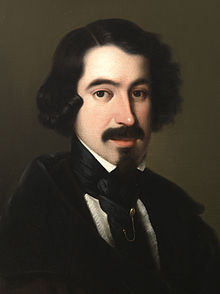José de Espronceda
José Ignacio Javier Oriol Encarnación de Espronceda y Delgado (born March 25, 1808 in Almendralejo ( province of Badajoz ), † May 23, 1842 in Madrid ) was a Spanish romantic poet .
Life
José de Espronceda was already as a middle school student at the Colegio de San Mateo in Madrid chairman of the secret society "Los numantinos" (1823-1825) and was therefore punished for five years in a monastery in Guadalajara . Various activities in the world of Spanish Freemasonry were followed by police persecution, imprisonment and finally in 1826 emigration to Gibraltar , Lisbon , London , Brussels and Paris . He fell in love with 16-year-old Teresa Mancha, daughter of the liberal Colonel Epifanio Mancha, and traveled to London after her. Espronceda took an active part in the French July Revolution of 1830 and in a failed conspiracy against Ferdinand VII . On his return he found Teresa married to a merchant named Guillermo del Amo, kidnapped her in 1831, and a daughter, Blanca, was born. After the amnesty of 1833 Espronceda was able to return to Spain and in 1841 became a Republican MP, but he was always under police surveillance. Teresa left him in 1836 and soon died of tuberculosis. From then on, Espronceda devoted himself to politics and journalism. Among other things, he was a member of the Spanish Cortes for the Partido Progresista.
He died of diphtheria at the age of 34 .
plant
Espronceda is a poet of despair and enthusiasm, often gagged and pathetic, but on the other hand he is characterized by great musicality and imagination. He made violent protest against the conservative society and therefore often gave outsiders such as the pirate, the beggar, the executioner etc. a voice in his poems. His protagonists rebel against society and convention, he cultivates an anarchic individualism à la Byron . Espronceda was a pioneer of committed literature (see his journalistic work, especially the famous article "Libertad, Igualdad, Fraternidad" from 1835). He founded the newspaper El Siglo , which fell victim to Spanish censorship after only 14 issues : the famous last issue consisted only of headlines and blank spaces.
Poetry
- "Canción del pirata" 1830 (song of the pirate)
- Canciones 1840, 5 poems in deliberately popular language, regardless of metric: "El canto del cosaco", "El mendigo", "El reo de muerte", "El verdugo", "A Jarifa en una orgía"
- “ El estudiante de Salamanca ” 1840 (The student of Salamanca): narrative poem, ballad.
- El diablo mundo 1841 (Der Weltteufel): epic fragment with a fist theme, including the famous "Canto a Teresa"
Secondary literature
- Christoph Strosetzki: History of Spanish Literature . 2nd Edition. Niemeyer, Tübingen 1996, ISBN 3-484-50307-6 .
- Hans U. Gumbrecht: A history of Spanish literature . Suhrkamp, Frankfurt am Main 1998, ISBN 3-518-58062-0 .
- Martin Franzbach: History of Spanish Literature at a Glance . Reclam, Stuttgart 2002, ISBN 3-15-008861-5 .
- Hans-Jörg Neuschäfer: Spanish literary history . 2nd Edition. Metzler, Stuttgart 2006, ISBN 3-476-01857-1 .
Individual evidence
Web links
- Literature by and about José de Espronceda in the catalog of the German National Library
- Literature by and about José de Espronceda in the catalog of the Ibero-American Institute in Berlin
- Literature by and about José de Espronceda in the catalog of the library of the Instituto Cervantes in Germany
- Cervantes Virtual (original texts in Spanish)
| personal data | |
|---|---|
| SURNAME | Espronceda, José de |
| ALTERNATIVE NAMES | José Ignacio Javier Oriol Encarnación de Espronceda y Delgado |
| BRIEF DESCRIPTION | Spanish lyric poet |
| DATE OF BIRTH | March 25, 1808 |
| PLACE OF BIRTH | Almendralejo |
| DATE OF DEATH | May 23, 1842 |
| Place of death | Madrid |
